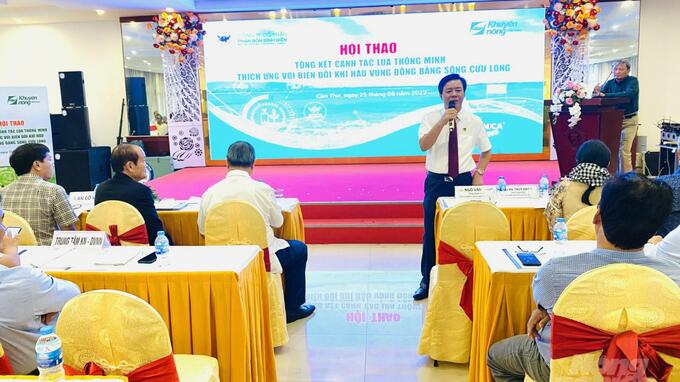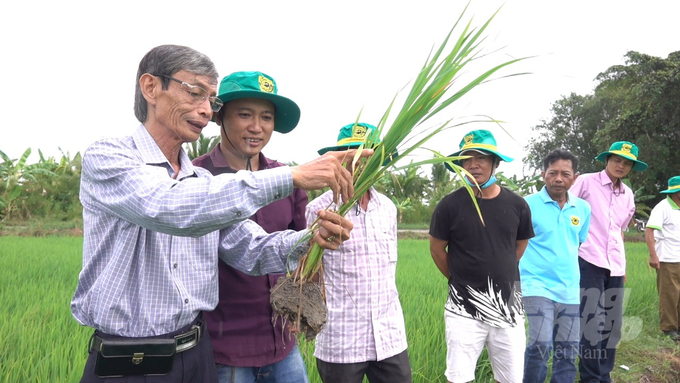May 29, 2025 | 15:58 GMT +7
May 29, 2025 | 15:58 GMT +7
Hotline: 0913.378.918
May 29, 2025 | 15:58 GMT +7
Hotline: 0913.378.918

Mr. Ngo Van Dong, General Director of Binh Dien Fertilizer Joint Stock Company, spoke at the seminar. Photo: Le Hoang Vu.
On August 25, the National Center for Agricultural Extension, in collaboration with Binh Dien Fertilizer Joint Stock Company and 13 agricultural extension and service centers in the provinces and cities in the Mekong Delta, held a seminar to summarize the smart rice farming program adaptation to climate change in the Mekong Delta for the period of 2020 - 2022.
The smart rice farming program, which started in 2016, has gone through two phases with great success. Smart rice farming program in the Mekong Delta marks a new step in building and developing innovative, efficient, safe, and sustainable agriculture.
Mr. Ngo Van Dong, General Director of Binh Dien Fertilizer Joint Stock Company, said that the smart rice farming program has so far implemented 495 demonstration fields with an area of 247.5 hectares in 13 provinces and cities in the Mekong Delta.
Many farming solutions have been applied effectively, such as reducing the amount of seed sown to less than 80kilograms per hectare, reducing the amount of fertilizer suitable for each cultivation condition, effective irrigation water management, and pest and disease management following IPM…
Smart rice farming program gives outstanding productivity increases from 200-870 kilograms per hectare, and average profit increases by VND 3.5-5.9 million per hectare, contributing to increasing income for farmers in the future and stabilizing and developing rice cultivation in the region.
According to Mr. Ngo Van Dong, in addition to providing smart and synchronous rice farming solutions to reduce costs and increase productivity and profit for farmers. The smart rice farming program also conducts many training sessions for technical staff and farmers with about 7,000 participants.
In 2022, Binh Dien Fertilizer Joint Stock Company will continue to use the smart rice farming application and guide people to install the application in most events so that Binh Dien Fertilizer Joint Stock Company can take care of people and customer agents quickly and professionally. In addition, the program also focuses on analyzing soil samples in all models in each crop and analyzing rice samples to evaluate pesticide residues to support the control of safety criteria for output products.
Mr. Le Quoc Thanh, Director of the National Center for Agricultural Extension, said: Currently, for rice production, the Mekong Delta has become a huge brand name not only in the country but also in the international market.
"Through the cooperation between the National Agricultural Extension Center and Binh Dien Fertilizer Joint Stock Company in implementing the smart rice farming program, we hope this program will continue to be expanded in 13 provinces in the Mekong Delta. From there, we can provide the best solutions to help Mekong Delta farmers grow smart and efficient rice," said Mr. Le Quoc Thanh.

Smart rice farming models all give outstanding increases in productivity. Photo: Le Hoang Vu.
The smart rice farming program is entering the final stage of the summer-autumn crop 2022, which is also the end of the cooperation agreement to implement the program between Binh Dien Fertilizer Joint Stock Company and the National Center for Agricultural Extension.
At Agritechnica Asia Live 2022, held in Can Tho, Binh Dien and the National Agricultural Extension Center also signed a cooperation agreement to implement the smart farming program for rice and other crops in the 2022-2025 period.
Mr. Ngo Van Dong, General Director of Binh Dien, also shared more about the orientation for the smart rice farming program in the coming period: Firstly, Binh Dien Fertilizer Joint Stock Company continues to coordinate with the Center for Agricultural Extension. The country accelerates the registration and reports to the competent authorities to recognize the smart rice farming process as scientific and technical progress applied to production.
Secondly, the smart rice farming program has brought outstanding results, and Binh Dien Fertilizer Joint Stock Company wishes that the media agencies, local units together with the National Center for Agricultural Extension, and the Company Binh Dien Fertilizer Joint Stock Company will have better communication plan so that people can enjoy more benefits from this program.
Thirdly, Binh Dien Fertilizer Joint Stock Company continues to improve programs to contribute to green production, reduce greenhouse gas emissions and help farmers have competitive products in the market.
Fourth, Binh Dien Fertilizer Joint Stock Company continues to coordinate with the National Agricultural Extension Center and local agricultural extension centers to deploy smart farming programs for other crops such as fruit trees, coffee trees, rubber trees, or some crops with high economic efficiency.
"From 2016 to 2022, the smart rice farming program has brought many benefits to rice farmers in the Mekong Delta. The individuals participating in the program all hope that the smart rice farming program will be replicated throughout the Mekong Delta and the whole country," said Mr. Ngo Van Dong, General Director of Binh Dien Fertilizer Joint Stock Company.
Translated by Ha Phuc
/2025/05/25/4127-3-073637_820.jpg)
(VAN) Thanks to the promotion from an FAO-implemented project, vegetable production in greenhouses in Moc Chau has seen strong development, from 1.5 hectares in 2021 to nearly 50 hectares in 2024.

(VAN) FAO has recently supported USD 140,000 to implement the project 'Risk mitigation human-animal interface risks through disease control initiatives in pig farming.'

(VAN) The People's Committee of Tra Vinh province has approved an adjustment to the investment policy for the Green Hydrogen Plant project, increasing its area to approximately 52.76 hectares.
![Reducing emissions from rice fields: [2] Farmers’ commitment to the soil](https://t.ex-cdn.com/nongnghiepmoitruong.vn/608w/files/news/2025/05/05/dsc08881jpg-nongnghiep-140632.jpg)
(VAN) Clean rice cultivation model in Thuong Tan commune, Bac Tan Uyen district, is assisting local residents in achieving sustainable agriculture by substantially reducing costs, increasing productivity, and protecting the environment.

(VAN) At the conference to disseminate Resolution No. 68, AgriS introduced its digital agricultural ecosystem and reaffirmed its commitment to accompanying the Government in promoting private sector development and sustainable agriculture.

(VAN) 'Blue Ocean - Blue Foods' initiative is designed to restore marine ecosystems and establish sustainable livelihoods for local communities by cultivating a minimum of 1,000 hectares of cottonii seaweed in the first three years.
/2025/05/21/4642-3-112707_603.jpg)
(VAN) The V-SCOPE project has made direct contributions to three out of six pillars of the Comprehensive Strategic Partnership between Vietnam and Australia.